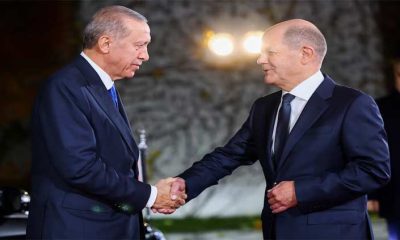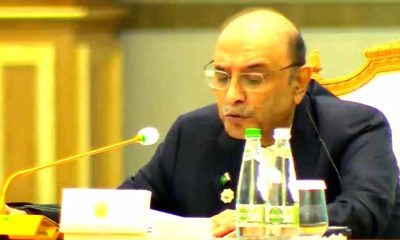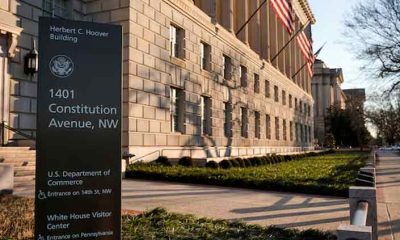World
US Senate Democrats help advance Republican bill on migrants accused of theft

US Senate Democrats provided the votes on Friday to advance a bill requiring authorities to detain migrants who entered the country illegally if they are suspected of theft, days before President-elect Donald Trump returns to power.
The Senate voted 61-35 to limit debate on the “Laken Riley Act,” named after a Georgia college student who was murdered last year by a Venezuelan man previously arrested for shoplifting who entered the country illegally. Ten Democrats voted in favor, allowing the bill to clear the Senate’s 60-vote threshold to advance most legislation.
The vote sets the stage for passage as soon as next week.
Trump campaigned on a promise to crack down on illegal immigration and “migrant crime,” though a range of studies by academics and think tanks have shown that immigrants do not commit crime at a higher rate than native-born Americans.
The bill could not have advanced without Democratic support.
On Jan. 9, the House of Representatives voted 264-159 to pass the bill, with 48 Democrats supporting it.
Figures from Immigration and Customs Enforcement released on Thursday estimated that the legislation would require 110,000 additional beds beyond the 41,500 funded in the last fiscal year.
When counting additional transportation, staffing and other expenditures, it would cost $26.9 million annually at its peak.
This is just the first step, however, in Republicans’ immigration and border security efforts. A far broader set of changes to existing law is expected to be unveiled sometime this year.
It is still unclear whether Republicans would try to advance a wide-ranging bill unilaterally or with some Democratic support.
House Democratic Leader Hakeem Jeffries has said that there is a possibility of such bipartisanship on immigration and border security. But Republicans might seek a measure far stricter than Democrats could embrace. If so, they would attempt to use a special procedure that would circumvent the need for supermajority support in the Senate.
Trump has talked about mass deportations of immigrants living in the US illegally, while some of his supporters have espoused the eventual elimination of all immigration into the United States.
World
The U.S. Presidential Election 2024: Donald Trump’s Triumphant Return

The 2024 U.S. Presidential Election has undoubtedly been one of the most talked-about events of recent times. With its dramatic twists, intense campaigns, and unexpected outcomes, this election saw Donald Trump make a historic comeback to the Oval Office. Here’s an in-depth look at how it unfolded and what it means for the future.
A Campaign Like No Other
Donald Trump, the 45th President of the United States, launched his campaign with a promise to “restore America’s greatness” once again. Running on a platform focused on economic revitalization, stricter border policies, and a stronger America-first agenda, Trump appealed to his core supporters while attempting to broaden his base.
His primary opponent, Democratic candidate Kamala Harris, served as Vice President under Joe Biden and campaigned on issues such as climate change, healthcare reform, and social equity. Harris aimed to continue the progress made during the Biden administration, contrasting sharply with Trump’s conservative policies.
Key Moments in the Race
- The Debates: The televised debates were pivotal in shaping public opinion. Trump’s aggressive style clashed with Harris’s composed demeanor, leading to a deeply divided electorate. Both candidates sparred over topics like inflation, foreign policy, and social justice.
- Swing States: As in previous elections, swing states played a critical role. Trump’s rallies in states like Pennsylvania, Michigan, and Wisconsin drew massive crowds, signaling his enduring popularity in these regions. His messages resonated with voters concerned about economic challenges and cultural shifts.
- Turnout: Voter turnout reached record highs, with millions casting their votes early or via mail-in ballots. This surge reflected the high stakes and emotional investment in the election.
The Victory
Trump’s victory was sealed with a decisive win in key battleground states, flipping some traditionally blue states back to red. His campaign’s strategic use of social media and grassroots mobilization efforts were instrumental in energizing his base and securing his return to power.
The results sparked celebrations among Trump’s supporters, who viewed his win as a vindication of their values and priorities. At the same time, protests erupted in major cities, with critics expressing concerns about the implications of his policies for marginalized communities and international relations.
Implications for the Future
Donald Trump’s return to the presidency raises several questions about the direction of U.S. politics and policy:
- Domestic Policies: Trump’s administration is expected to focus on deregulation, tax cuts, and stricter immigration enforcement. His stance on issues like abortion and gun rights may lead to significant legal and social battles.
- Foreign Relations: Trump’s “America First” approach suggests potential shifts in alliances and trade agreements. His relationship with NATO, China, and other key players will be closely watched.
- Polarization: The election underscored the deep divisions within American society. Bridging the gap between opposing factions will be a monumental challenge for the new administration.
Conclusion
The 2024 U.S. Presidential Election marked a significant moment in history, not just for the United States but for the world. Donald Trump’s victory underscores the power of his influence and the enduring appeal of his message to a large segment of the population. As the nation moves forward, all eyes will be on how this administration navigates the complexities of governance in an increasingly polarized world.
World
Detained South Korea’s Yoon will not attend questioning, lawyer says
Yoon, the first sitting South Korean president to be arrested, was taken to the Seoul Detention Centre on Wednesday evening after refusing to cooperate, where he was expected to have spent the night in a solitary cell.
Authorities have 48 hours to question the suspended president, after which they must release him or seek a warrant to detain him for up to 20 days.
Yoon’s refusal to cooperate with investigators comes as the Constitutional Court is due to hold a second hearing in his impeachment trial to determine whether to remove him permanently or reinstate his presidential powers.
South Korea is grappling with its worst political crisis in decades, sparked by Yoon’s brief attempt to impose martial law on Dec. 3 that was voted down by parliament.
Yoon’s arrest on Wednesday ended a weeks-long standoff with authorities after police swooped before dawn on his fortified hillside villa in Seoul to the despair of followers at the site.
Yoon said he turned himself in for questioning by corruption investigation officials to prevent what he called the risk of “unsavoury bloodshed”, though he continued to protest that it was an illegal investigation and invalid arrest warrant.
Yoon has up to now refused to talk with investigators who had prepared a questionnaire of more than 200 pages, an official from the Corruption Investigation Office for High-ranking Officials (CIO) that is heading the criminal inquiry said on Wednesday.
The embattled leader did not even reply to a question, a CIO official said.
His questioning is due to resume at 2 pm (0500 GMT) on Thursday afternoon, according to CIO.
But Yoon Kab-keun, one of Yoon’s lawyers, said in a text message to reporters that Yoon would not show up for the questioning.
Yonhap reported the same lawyer as citing Yoon’s health as a factor and saying further questioning was pointless, without elaborating.
The CIO official said he understood it was possible to forcibly bring Yoon for questioning but would make further checks on relevant laws.
A small crowd of protesters supporting Yoon gathered and sat on a road outside the CIO office, calling the president’s arrest illegitimate.
His lawyers have said the arrest warrant is illegal because it was issued by a court in the wrong jurisdiction and the team set up to investigate him had no legal mandate to do so.
They have also asked another court to review the legality of the arrest.
His legal team has flatly denied allegations against Yoon of masterminding insurrection, a crime in South Korea punishable by life imprisonment or even the death penalty.
Yoon’s arrest period of 48 hours has been temporarily paused while a court review is underway, according to the CIO.
Separately, after parliament impeached Yoon on Dec. 14 over his martial law attempt the Constitutional Court will now decide whether to uphold the impeachment.
Opinion polls show a majority of South Koreans support impeaching Yoon, but the attempts to arrest him appear to have rallied his hardcore supporters.
The political crisis has reverberated across Asia’s fourth-largest economy and piled pressure on the won currency.
South Korea’s central bank on Thursday unexpectedly left its policy interest rate unchanged, weighing the impact of its back-to-back rate cuts last year, while supporting the won which weakened to a 15-year low versus the US dollar in recent weeks.
The majority of analysts in a Reuters poll had expected a cut in rates.
World
Biden to hand unfinished agenda to Trump for chaotic Mideast

US President Joe Biden’s national security adviser Jake Sullivan described the Middle East in late September 2023 as “quieter” than it had been in two decades.
That assessment did not age well.
Just eight days later, Hamas launched a deadly surprise attack from Gaza into Israel, triggering a war that devastated the Palestinian enclave and spread turmoil across the region – a cascade of crises that has cast a cloud over Biden’s foreign policy legacy as he prepares to leave office on Jan. 20.
Even with Biden aides having played a major role in securing a Gaza ceasefire deal for Hamas’ release of hostages announced on Wednesday, Biden’s Middle East record is likely to be remembered not so much for how conflicts ended on his watch but mainly for how they unfolded, seemingly beyond his ability to contain them, analysts say.
This also means there will be plenty of unfinished business to hand over to once-and-future president Donald Trump and his incoming administration.
Biden’s record on the world stage is likely to be heavily defined by his handling of the 15-month war in Gaza, part of what Trump and his fellow Republicans have seized on as a “world on fire” during the Democratic president’s tenure. They accuse Biden of weak resolve that encouraged foes to foment chaos throughout the region.
Biden’s allies contend that he has had to confront a set of Middle East challenges not of his making and has handled them skillfully, weakening Iran and its regional proxies while working to limit civilian casualties in Gaza and Lebanon.
But Biden’s steadfast support for Israel in a response that decimated Hamas but also killed tens of thousands of civilians in Gaza took a heavy toll on US international credibility. It also divided his Democratic Party, one of many factors in Vice President Kamala Harris’ defeat by Trump in the November election.
“The upside is Biden came to Israel’s defense as a reliable ally,” said Aaron David Miller, a former Middle East adviser to Democratic and Republican administrations. “The downside is he had little success constraining (Prime Minister Benjamin) Netanyahu in Gaza, and that’s done serious reputational damage to the US.”
The Gaza ceasefire plan hammered out in the final days of Biden’s term after months of on-off negotiations was based on proposals he announced in mid-2024 and required dogged persistence alongside Qatari and Egyptian mediators to get across the finish line.
But the last-minute diplomatic breakthrough in Doha was widely seen by regional players as more a result of Trump’s warnings that there would be “hell to pay” if the hostages were not released by the time of his inauguration on Monday, a threat likened by a Middle East source close to the Gaza talks to a “sword” hanging over the negotiators.
Trump dispatched his incoming Middle East envoy, Steve Witkoff, to collaborate with Biden’s chief negotiator, Brett McGurk, and an Israeli official said Witkoff’s presence added momentum to the talks.
“Witkoff was able to pressure Netanyahu into accepting the deal and moving quickly,” an official briefed on the talks said, referring to a meeting with the conservative leader who had forged a close relationship with Trump during his first term.
Netanyahu’s cabinet will vote on the agreement on Thursday, with a majority of ministers expected to approve it, an Israel government official told Reuters.
Though Secretary of State Antony Blinken on Tuesday laid out a proposal for post-war Gaza, it will be up to the Trump administration to ensure full implementation of the ceasefire plan and decide how much of a role to play in the “Day After.”
BIDEN DRAWS CREDIT AND CRITICISM
In his final year in office, Biden has been credited with forging an international coalition that helped shield Israel against Iranian missile attacks and for consenting to Israeli counterstrikes against Tehran’s air defenses – though he had warned against hitting Iranian nuclear and oil sites.
Despite US calls for restraint in Lebanon, Israel last year dealt one blow after another against Hezbollah militants, often with little or no advance notice to Washington. That was seen as the main impetus for the Iran-backed Islamist group’s agreement to a US-backed ceasefire in November.
The Biden administration was then caught off guard by a lightning rebel offensive that toppled Syrian leader Bashar al-Assad, another major Iranian ally, in early December. It has been scrambling since to persuade the new Islamist rulers to form an inclusive government and prevent an Islamic State resurgence, tasks that Trump will now inherit.
“The greatest feat is Biden didn’t get in the way of Israel, but he constantly counseled ‘don’t do this, don’t do that’,” said Elliott Abrams, who was Trump’s special envoy on Iran during his first term and now rates Biden’s Middle East record as “mediocre.”
“I don’t think he deserves much credit in Lebanon or Syria,” he added.
Biden, in his farewell foreign policy speech at the State Department on Monday, defended his approach, insisting that the US contributed significantly to Iran now being “weaker than it’s been in decades.”
Some experts have also commended him for helping avert an all-out regional war.
But Biden still leaves Trump with what most analysts see as his biggest Middle East challenge – an Iranian nuclear program that has advanced over the past four years and could race toward developing a nuclear weapon if it decides to do so.
It was Trump’s decision to abandon the international nuclear deal with Iran in 2018 that critics say opened the way to its nuclear moves, and Blinken on Tuesday counted it as one of Biden’s successes that Tehran has been deterred from obtaining a nuclear bomb.
Once back in office, Trump will have to decide whether to pursue a new nuclear pact with Iran or give Netanyahu the green light to hit Iranian nuclear facilities.
“The decision on how to approach Iran ultimately will drive much of Trump’s decision-making related to the region as a whole,” said Jonathan Panikoff, a former US deputy national intelligence officer on the Middle East.
Trump will also have to respond to another Iran-aligned group, Yemen’s Houthis, who for more than a year have fired missiles at Red Sea shipping and toward Israel. Military action ordered by Biden and coordinated with U.S. allies has failed to end the Houthi threat.
While acknowledging the Middle East remains “rife with risk,” Blinken, in his final policy speech, cited accomplishments he said included helping the UN broker a ceasefire in Yemen’s civil war, strengthening the international coalition against Islamic State and deepening regional integration.
SAUDI-ISRAEL NORMALIZATION EFFORT UPENDED
Sullivan was widely mocked by Biden’s critics after the Oct. 7, 2023, Hamas rampage for his comments little more than a week earlier that the Middle East “is quieter today than it has been in two decades” – even as he acknowledged continuing challenges.
Though Sullivan later defended his remarks, telling NBC News they were in the context of regional developments in the past few years and the administration had not taken its “eye off the ball,” the decades-old Israeli-Palestinian conflict upended Biden’s global agenda.
Shortly after the attack by Hamas gunmen – who killed 1,200 people in Israel and seized more than 250 hostages – Biden, a self-described “Zionist,” became the first U.S. president to visit the country during wartime.
He then kept up a steady flow of weapons to Israel for its declared effort to destroy Iran-backed Hamas, despite frequent pushback from Netanyahu against U.S. demands to curb civilian casualties and ease the humanitarian crisis in Gaza.
Biden’s resistance to using US leverage as Israel’s chief arms supplier alienated many Arab American voters and sent shockwaves through the US diplomatic corps.
“Gaza will be the legacy,” said Mike Casey, a former State Department official with 15 years as a foreign service officer who was among those who resigned in protest. “They’re going to find bodies in rubble. People are going to continue to die from disease … It’s always going to come back to him.”
The White House did not respond to a request for a response to criticism of its Gaza policy.
At the same time, the Gaza war derailed Biden’s efforts to broker landmark normalization between Israel and Saudi Arabia coupled with US security guarantees for the kingdom.
Some Arab governments are now waiting to see whether Trump, who in his first term arranged diplomatic ties between Israel and several Arab states under the Abraham Accords, will revive normalization efforts and also take a tougher stand against Iran.
Within the Trump camp, there is a sense that an Israeli-Saudi deal is still possible, according to a source familiar with the matter.
But even though some Arab allies have had relatively cool relations with Biden, they remain wary of Trump, given his past unwillingness to pressure Netanyahu to agree on a pathway to Palestinian statehood, which has long been a Saudi condition for normalization with Israel.
“Biden hasn’t been seen as the Arab world’s best friend,” said one Middle East diplomat in Washington. “But we still also don’t know exactly what to expect from Trump 2.0.”
-

 pakistan3 months ago
pakistan3 months agoPunjab govt imposes Section 144 in five districts
-

 World3 months ago
World3 months agoGermany’s Scholz to discuss Middle East, Ukraine with Erdogan in Istanbul
-

 Business2 months ago
Business2 months agoAuto industry’s shift toward EVs is expected to go on despite Trump threat to kill tax credits
-

 Entertainment2 months ago
Entertainment2 months agoBeyoncé leads the 2025 Grammy noms, becoming the most nominated artist in the show’s history
-

 pakistan3 months ago
pakistan3 months agoPakistan shares exemplary bond with Turkmenistan: President Zardari
-

 Business2 months ago
Business2 months agoWall Street cruises toward the close of its best week in a year
-

 Sports3 months ago
Sports3 months agoHome hopes Zheng and Wang through to last-eight in Wuhan Open
-

 World2 months ago
World2 months agoSix Israeli troops killed, deadly strikes in Lebanon

















